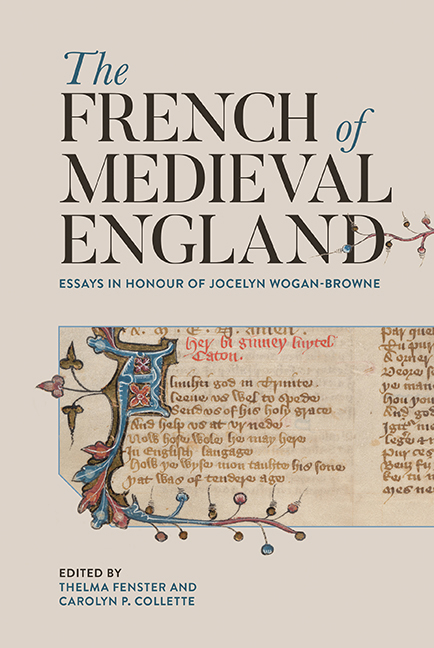Book contents
- Frontmatter
- Contents
- List of Illustrations
- List of Contributors
- List of Abbreviations
- Foreword: ‘The Light I Never Left Behind’: Jocelyn Wogan-Browne
- Introduction: Recognizing the French of Medieval England
- 1 The Gloss to Philippe de Thaon's Comput and the French of England's Beginnings
- 2 The Scandals of Medieval Translation: Thinking Difference in Francophone Texts and Manuscripts
- 3 Contrafacture and Translation: The Prisoner's Lament
- 4 Complaining about the King in French in Thomas Wright's Political Songs of England
- 5 The Chanson d’Aspremont in Bodmer 11 and Plantagenet Propaganda
- 6 The Use of Anglo-Norman in Day-to-Day Communication during the Anglo-Scottish Wars (1295–1314)
- 7 Middle English Borrowing from French: Nouns and Verbs of Interpersonal Cognition in the Early South English Legendary
- 8 William Langland Reads Robert Grosseteste
- 9 Disability Networks in the Campsey Manuscript
- 10 English Women and Their French Books: Teaching about the Jews in Medieval England
- 11 French Residents in England at the Start of the Hundred Years War: Learning English, Speaking English and Becoming English in 1346
- 12 French Immigrants and the French Language in Late-Medieval England
- 13 Fashioning a Useable Linguistic Past: The French of Medieval England and the Invention of a National Vernacular in Early Modern France
- 14 Admiring Ambivalence: on Paul Meyer's Anglo-Norman Scholarship
- 15 Twenty-First Century Gower: The Theology of Marriage in John Gower's Traitié and the Turn toward French
- 16 Royaumes sans frontières: The Place of England in the Long Twelfth Century
- Afterword
- Bibliography
- Index
- Publications of Jocelyn Wogan-Browne
- Tabula Gratulatoria
13 - Fashioning a Useable Linguistic Past: The French of Medieval England and the Invention of a National Vernacular in Early Modern France
Published online by Cambridge University Press: 12 August 2020
- Frontmatter
- Contents
- List of Illustrations
- List of Contributors
- List of Abbreviations
- Foreword: ‘The Light I Never Left Behind’: Jocelyn Wogan-Browne
- Introduction: Recognizing the French of Medieval England
- 1 The Gloss to Philippe de Thaon's Comput and the French of England's Beginnings
- 2 The Scandals of Medieval Translation: Thinking Difference in Francophone Texts and Manuscripts
- 3 Contrafacture and Translation: The Prisoner's Lament
- 4 Complaining about the King in French in Thomas Wright's Political Songs of England
- 5 The Chanson d’Aspremont in Bodmer 11 and Plantagenet Propaganda
- 6 The Use of Anglo-Norman in Day-to-Day Communication during the Anglo-Scottish Wars (1295–1314)
- 7 Middle English Borrowing from French: Nouns and Verbs of Interpersonal Cognition in the Early South English Legendary
- 8 William Langland Reads Robert Grosseteste
- 9 Disability Networks in the Campsey Manuscript
- 10 English Women and Their French Books: Teaching about the Jews in Medieval England
- 11 French Residents in England at the Start of the Hundred Years War: Learning English, Speaking English and Becoming English in 1346
- 12 French Immigrants and the French Language in Late-Medieval England
- 13 Fashioning a Useable Linguistic Past: The French of Medieval England and the Invention of a National Vernacular in Early Modern France
- 14 Admiring Ambivalence: on Paul Meyer's Anglo-Norman Scholarship
- 15 Twenty-First Century Gower: The Theology of Marriage in John Gower's Traitié and the Turn toward French
- 16 Royaumes sans frontières: The Place of England in the Long Twelfth Century
- Afterword
- Bibliography
- Index
- Publications of Jocelyn Wogan-Browne
- Tabula Gratulatoria
Summary
Sometime in the 1530s, Henry VIII's chaplain Thomas Starkey addressed a text to the king in which he argued that:
our common law is written in the French tongue and therein disputed and taught, which, beside that it is again the common weal, is also ignominious, and dishonour to our nation, forasmuch as thereby is testified our subjection to the Normans. This thing appeareth to me not well, for common law would ever be written in the common tongue, that every man that would might understand the better such statutes and ordinances as he is bounden to observe.
Starkey articulates several criticisms of the persistence in sixteenth-century English legal life of Law French – the Anglo-Norman French idiom taught to law students and in which much medieval case law was transcribed. First, he sounds a clarion call for the vernacularization of English law, arguing that the public good depends on legal texts being drafted in an idiom everyone can understand. Second, he couches his translational injunction in terms not only of utility, but of national honor, arguing that English law's reliance on a foreign tongue represents nothing short of an odious stain on the kingdom. Third, he justifies his gallophobic language-planning initiative with a historical narrative that characterizes the Norman Conquest as a ‘subjection’ to a foreign power and the subsequent introduction of French into England as a humiliating mark of submission. Fourth, he traces sharp distinctions between ‘we’ English and ‘our’ English language, on the one hand, and Normans and the ‘French tongue’, on the other.
Starkey's condemnation of the linguistic and legal legacies of the Norman Conquest is interesting in several respects. It demonstrates that the French of England still mattered in his own day, as linguistic reality, object of historical reflection and subject for polemic. By proposing a radical break with this state of affairs, it represents nothing short of an attempt to denaturalize a language that had served as an important medium for English political, cultural and social life for centuries. For Starkey, there was nothing truly English about the French of England, and the sooner the Tudor kingdom's laws and lawyers were rid of it, the better.
- Type
- Chapter
- Information
- The French of Medieval EnglandEssays in Honour of Jocelyn Wogan-Browne, pp. 225 - 240Publisher: Boydell & BrewerPrint publication year: 2017

